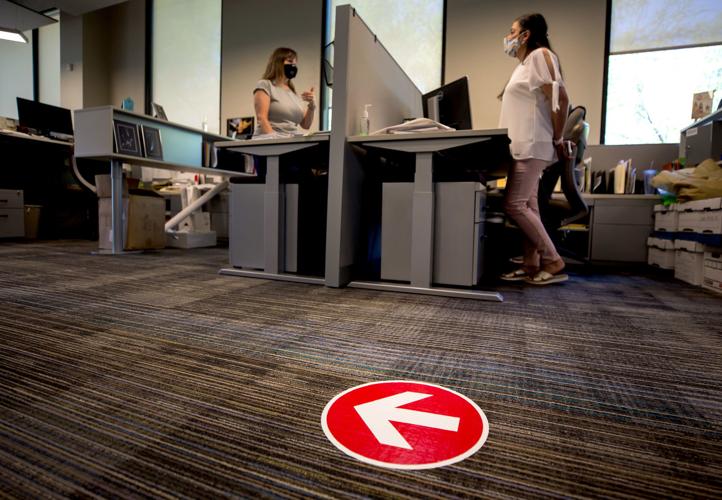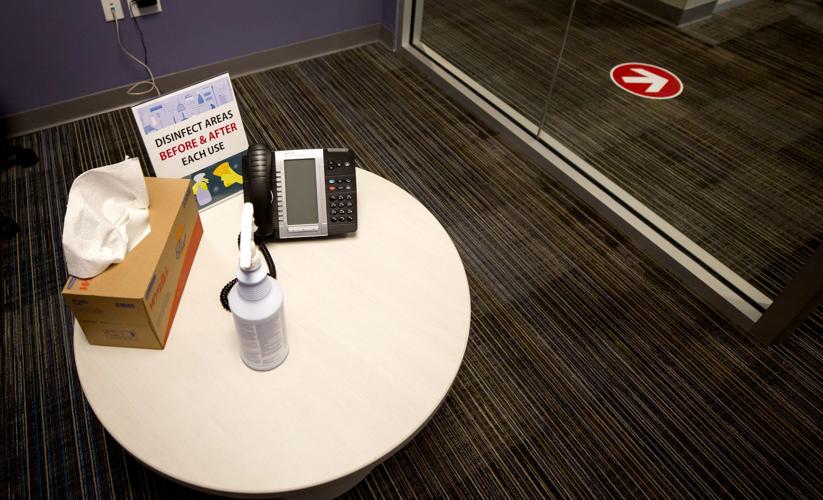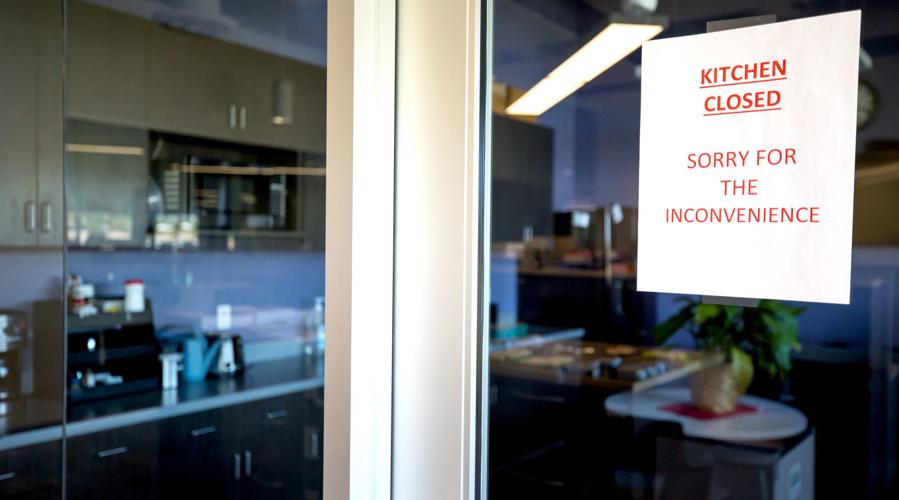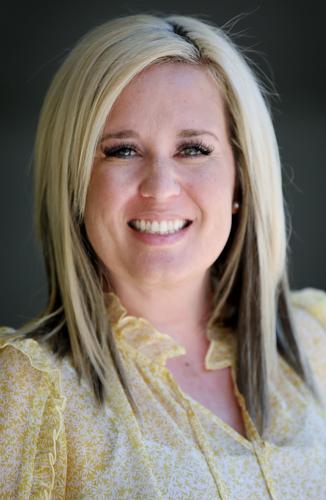Restaurants have been among the hardest-hit small businesses during the shutdowns prompted by the COVID-19 pandemic, and they have faced numerous challenges in reopening since a ban on dine-in business was lifted in mid-May.
But businesses like retail shops and office-based firms face their own sets of reopening issues — including managing employees and inventory safely and redesigning office spaces so employees avoid close contact.
While remaining restrictions, including a 50% indoor occupancy limit, has some small-business owners worried about whether they can hold on and do enough business to see them through, other issues — such as finding enough masks and other personal protective gear for employees — also are making it hard for many to reopen.
“For more of our public-facing members like retail and restaurants, one of the big concerns is the availability of personal protective equipment,” said Michael Guymon, vice president of local community and government affairs for the Tucson Metro Chamber.
To help businesses reopen safely and effectively, the Tucson Chamber has posted specific guidelines for restaurants, retailers and office-based businesses on its website, including downloadable safety-warning signage.
The guidelines detail pandemic safety practices broadly, including how to communicate with customers, vendors and employees about COVID-19 precautions; use of protective gear; policies on testing employees; sanitation practices; and controlling building access and indoor traffic.
“COVID-19 COMPLIANT”
Many office-based businesses like financial firms and call centers have instituted work-from-home programs over the last three months.
Some of those same companies are now instituting extensive safety procedures and adapting office layouts to bring many of those workers back.
After sending most of its 40 employees home to work at the outset of the pandemic, commercial real estate brokerage Cushman & Wakefield/Picor began a phased return to its office on East Broadway on June 1, CEO Barbi Reuter said.
Picor is following best practices developed by global real-estate giant and business partner Cushman & Wakefield in China, where the company has thousands of employees and learned valuable lessons from the early outbreak there.
The company set up three groups of employees — one that will continue to work from home, and two groups who report on a staggered schedule to minimize the chance of infections, Reuter said.
Before returning to work, PICOR employees fill out a health questionnaire and are asked to take their own temperatures, which should be below the fever level of 100.4 degrees.
The real-estate firm also has redesigned its office, closing its break room, removing chairs from conference rooms and creating a one-way path for foot traffic to avoid having employees pass each other, she said.
Reuter thinks safety concerns fueled by COVID-19 may reverse a trend of “densification” of office space, while leading to new discussions about the safety of open floor plans versus cubicle and individual office layouts.
Health concerns could prompt some office-based businesses like call centers to take more space to accommodate social distancing, while some companies may look to spread out operations to smaller suburban offices and move away from large central office sites, Reuter said.
“All that will take some time, I think it will take shape over the next few years as leases roll” and are re-evaluated, she said.
The Chamber’s Guymon said many member companies are taking a closer look at the benefits of a remote or partially remote workforce.
“I hear from a lot of employers that after what they’ve gone through for the last three months, they’re more accepting of work-at-home strategies, or moving to more of a hybrid strategy,” he said.
Meanwhile, a local developer has developed a concept for a virus-safe office space.
R+R Develop finished construction on a three-story office at 434 E. University Blvd. last November as the first phase of The Trinity, a mixed-use development that will eventually include a separate apartment building.
Health on University, a clinic set up by El Rio Health and Tucson Medical Center, opened on the building’s ground floor in December, said Randi Dorman, partner in R+R with her husband, architect Rob Paulus.
After the pandemic emerged, Dorman and Paulus decided to develop a “COVID-19 compliant” office design concept incorporating things like one-way travel corridors, spaced workstations, temperature screening and sanitizing stations, touch-free entry systems and bathroom and lighting controls, and upgraded air filtration.
“You really have to balance how to create a safe environment and reduce anxiety for your employees while maintaining productivity,” she said.
RETAIL CHALLENGES
Retailers like apparel stores that were closed to shoppers as nonessential under previous restrictions are making their spaces safe for browsing.
Stacy Madigan, owner of Chic Boutique and Spa in downtown Tucson, said she’s instituted intensive sanitation procedures for the store and spa suites that she leases to hairstylists, nail technicians, a massage therapist and a registered nurse who performs medical spa procedures like Botox injections.
She uses hospital-grade disinfectants, aiming to constantly wipe down literally any surfaces touched by customers in her small shop.
“If someone touches a hanger in the boutique, we wipe it down,” she said. “It’s hard, but it’s easier for us than a big-box retailer.”
Another local retailer, Standard Restaurant Supply, remained open as an essential food-related business during the pandemic, though it had to lay off three-quarters of its staff of about 15 and cut its hours.
The store, a branch of a Utah-based regional chain, sells supplies to retail customers as well as restaurants and has instituted all of the chamber’s recommended safety practices.
But it’s been a challenge because the way the store is set up, only one cash register can be used at a time while maintaining the advised social distance of 6 feet, said Kristen Leone, outside sales manager for Standard Restaurant Supply and a member of the Chamber’s Restaurant Advisory Council.
“People were trying to abide by the rules… but some people were getting frustrated that’s there’s only one line,” Leone said. “Just trying to keep folks happy has been a real struggle.”
Keeping safety equipment and cleaning supplies available for local restaurants also has been an issue at times, though the store has generally been stocked up with cleaning supplies and personal protective equipment like masks and gloves, she said.
“The challenge this week was gloves — we actually got some in, and it’s like Christmastime when something like that comes in,” Leone said.
Among the safety equipment in demand are hand-sanitizer stands, clear plastic barriers — which Standard special-orders — and special, hooklike hardware that allows people to open doors with a forearm or foot to avoid hand contact, she noted.
STICKING POINTS
Guymon recently spearheaded the formation of a Restaurant Advisory Council with nearly 50 chamber members to advise policymakers on issues affecting restaurants and bars during the coronavirus crisis.
The chamber council, along with the Arizona Restaurant Association and the Arizona Craft Brewers Guild, successfully lobbied the Pima County Board of Supervisors to ease up on temporary COVID-19 safety regulations it imposed on restaurants in mid-May.
Ten days after passing the rules, the supervisors modified 15 of the 17 temporary rules, rescinding altogether rules requiring restaurants to use call-ahead reservation systems, to determine if customers are ill with COVID-19 and to post their cleaning logs.
Guymon said the chamber was pleased to see the supervisors modify the rules, but there are still some sticking points.
For example, Pima County in late May began allowing restaurants and bars to extend their outdoor seating areas to available spaces like parking lots under temporary zoning changes — but state laws allow liquor to be sold only in areas contiguous to the licensed premises, Guymon said.
“The challenge there is, a lot of restaurant revenue depends on liquor sales,” he said.
The chamber’s restaurant council has been discussing the issue with the state Department of Liquor Licenses and Control, but the Arizona Legislature — which is out of session — would likely have to change the law to allow sales in separated outdoor areas.









